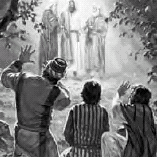Translated Beings
Translated beings are faithful servants of the Lord in the flesh who have been translated in order to continue serving in a protected, restful state until they are resurrected. Translated beings never taste of death; they never endure the pains of death; they have undergone a change in their bodies, "that they might not suffer pain nor sorrow save it were for the sins of the world" (3 Nephi 28:38). Translated beings have been "sanctified in the flesh, that the powers of the earth could not hold them." They are as the angels of God, ministering to whomever they will (3 Nephi 28:39). At the Second Coming of Christ, they will be changed in the twinkling of an eye from mortality to immortality to inherit exaltation in the Kingdom of God. After their ministry as translated beings, all translated beings receive what amounts to an instantaneous death and resurrection. [1]
During the time from the fall of Adam to the ministry of Melchizedek, numerous people were translated. Enoch and his people were translated (Moses 7:18–21, 31, 63, 69). They were citizens of the City of Enoch, also called Zion; Zion appears to have been a very populous city. During the nearly 700 years from the translation of Enoch and Zion, it appears that nearly all the faithful members of the Church were translated, for "the Holy Ghost fell on many, and they were caught up by the powers of heaven into Zion" (Moses 7:27).
The Apostle Paul says that Abraham, Isaac, and Jacob "looked for a city which hath foundations, whose builder and maker is God" (Hebrews 11:5–10). They sought for the City of Enoch, which "God had before taken" (Inspired Version, Genesis 14:34). Paul said, and the Lord confirmed in Latter-day revelation, that even these "holy men . . . found it not because of wickedness and abominations; And confessed they were strangers and pilgrims on the earth; But obtained a promise that they should find it and see it in their flesh" (Doctrine and Covenants 45:11–14; Hebrews 11:11–16).
Moses, Elijah, and Alma the Younger (in the Book of Mormon) were translated. The Book of Mormon says that Alma "was taken up by the Spirit," and that "the scriptures saith the Lord took Moses unto himself; and we suppose that he has also received Alma in the spirit, unto himself" (Alma 45:18, 19). Moses and Elijah were translated for a purpose. Though dead, and though no resurrection had yet taken place, they were able to come with bodies of flesh and bone to confer keys upon Peter, James, and John on the mount of transfiguration (Matthew 17:1–6). [2]
After Christ's resurrection and the resurrection of the just along with Him, resurrected beings have been able to minister to the earth. (See Angels.) However, a few people who have lived during the Christian era have been translated. Jesus said, "There be some standing here which shall not taste of death, till they see the Son of man coming in his kingdom" (Matthew 16:28; Mark 9:1; Luke 9:27). The Lord told Joseph Smith, "All are under sin, except those which I have reserved unto myself, holy men that ye know not of" (Doctrine and Covenants 49:8). John the Beloved was translated (John 21:20–23), and in the Americas, three of the Twelve disciples among the Nephites were translated, so that they could minister unto the peoples of the earth until the Second Coming.
The status of translated beings is terrestrial. This is the same state that existed in the Garden of Eden and that will exist on earth during the Millennium, but it is not the perfected state of celestial, resurrected beings.
In the Book of Revelation John speaks of those who are tortured and bear it for a witness of Christ.
- And I heard a voice from heaven saying unto me, Write, Blessed are the dead which die in the Lord from henceforth: Yea, saith the Spirit, that they may rest from their labours; and their works do follow them (Revelation 14:13).
Joseph Smith proclaimed that "they rest from their labors for a long time, and yet their work is held in reserve for them, that they are permitted to do the same work after they receive a resurrection for their bodies." [3]
